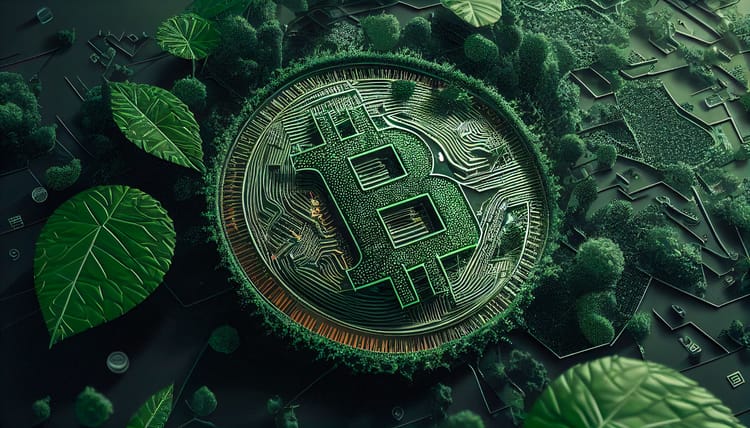The Intersection of Blockchain and the Circular Economy: Revolutionizing Waste Management and Resource Efficiency

The circular economy, a model that promotes reduced waste and resource efficiency, has gained significant attention in recent years as a viable solution for achieving global sustainability. At the same time, blockchain technology has emerged as a powerful tool with the potential to enable and enhance circular economy initiatives. In this comprehensive article, we'll explore the fascinating connection between blockchain technology and the circular economy, focusing on waste management, supply chain traceability, and resource allocation. By analyzing real-world data and examples, we'll demonstrate the potential of blockchain to revolutionize industries and contribute to a more sustainable future.
Blockchain and Waste Management
Blockchain technology is transforming waste management by providing transparent and accurate data on waste generation. By creating immutable records of waste-related transactions, blockchain can help businesses and governments identify waste hotspots, streamline waste collection, and reduce overall waste production.
Companies like RecycleGO and WasteLedger are developing blockchain-based platforms that track waste generation and recycling activities for businesses. These platforms enable organizations to identify areas for improvement and comply with recycling regulations. By leveraging the power of blockchain technology, waste tracking solutions can provide unprecedented insights into waste generation patterns, ultimately contributing to waste reduction and more efficient resource management.
1.1 Incentivizing Recycling and Waste Reduction
Blockchain can also be employed to incentivize recycling and waste reduction behaviors through token systems. By assigning value to waste materials in the form of digital tokens, users are encouraged to recycle and reduce waste production.
In Sweden, a pilot project called Cirqle uses a blockchain-based platform to reward participants for recycling plastic packaging. Users earn tokens that can be redeemed for discounts or donated to environmental organizations, promoting a culture of recycling and responsible waste management.
Plastic Bank, another example of a blockchain-enabled recycling initiative, offers tokens to individuals in developing countries who collect and recycle plastic waste. The tokens can be exchanged for essential goods and services, providing an incentive for waste reduction and recycling.
1.2 Blockchain-based Waste Exchange Platforms
Waste exchange platforms leverage blockchain technology to facilitate the trade of waste materials between businesses. By promoting the reuse and repurposing of waste, these platforms contribute to a more circular and sustainable economy.
Recereum and Waste2Resource are examples of blockchain-based waste exchange platforms that enable businesses to trade waste materials for reuse or recycling. By creating a transparent and secure marketplace for waste trading, these platforms help reduce landfill waste and promote resource efficiency.
Blockchain and Supply Chain Traceability
Blockchain can dramatically improve supply chain traceability and visibility by creating a tamper-proof record of transactions and product movements. This increased transparency allows businesses to more efficiently allocate resources, ensure responsible sourcing, and minimize waste.
Everledger, a global startup, uses blockchain to track the origin of diamonds, ensuring that they are ethically sourced and conflict-free. Similarly, IBM Food Trust leverages blockchain technology to track food products from farm to fork, enabling businesses to identify and address inefficiencies, reduce food waste, and promote more sustainable practices.
2.1 Reducing Waste and Enhancing Resource Efficiency in the Supply Chain
Blockchain technology can help identify inefficiencies and opportunities for waste reduction within supply chains by providing a comprehensive view of resource flows. Companies can use this information to optimize their processes, reduce waste, and conserve resources.
Circularise, a blockchain-based platform, allows businesses to track materials throughout their supply chain, helping them identify waste and optimize resource usage. Provenance, another blockchain-based solution, enables companies to track the lifecycle of products, ensuring ethical sourcing and promoting circular economy principles.
2.2 Blockchain and Product Lifecycle Management
Blockchain technology can streamline product lifecycle management by providing a secure and transparent platform for tracking the lifecycle of resources and products. This approach enables businesses to optimize their operations, reduce waste, and promote circular economy principles.
Modum, a blockchain-based product lifecycle management solution, allows companies to track the entire lifecycle of a product, from raw material sourcing to end-of-life disposal. This comprehensive view of the product lifecycle helps businesses identify waste, reduce inefficiencies, and optimize resource allocation.
Arianee is another blockchain-based platform that enables brands to create digital passports for their products, documenting their origin, composition, and potential reuse. When a product reaches the end of its life, the digital passport can facilitate recycling and repurposing, reducing waste and promoting resource efficiency.
Blockchain and Resource Allocation
Blockchain can facilitate more efficient and transparent allocation of resources, such as energy, water, or materials, by providing a decentralized and secure platform for tracking and managing resources. This decentralized approach can optimize resource allocation and reduce waste.
LO3 Energy has developed a blockchain-based platform called Exergy, which enables users to trade excess renewable energy with their neighbors. This decentralized approach to energy distribution not only promotes the adoption of clean energy sources but also optimizes resource allocation and reduces waste.
Similarly, Power Ledger is a blockchain-based energy trading platform that allows users to buy and sell excess renewable energy, promoting efficient energy distribution and reducing waste in the energy sector.
3.1 Promoting a Circular Approach to Resource Management
Blockchain technology can enable circular resource management models by providing a secure and transparent platform for tracking the lifecycle of resources. Material passports, for example, can be created using blockchain to document the origin, composition, and potential reuse of materials in a product. When a product reaches the end of its life, the material passport can facilitate recycling and repurposing, reducing waste and promoting resource efficiency.
Decentralized water management systems are another example of how blockchain can promote circular resource management. These systems use blockchain technology to create transparent and secure records of water usage, allowing for more efficient water allocation and reducing waste in water-intensive industries.
3.2 Blockchain and Carbon Emissions Tracking
Blockchain technology can play a crucial role in tracking carbon emissions, enabling businesses and governments to accurately measure their environmental impact and implement effective emissions reduction strategies.
The Poseidon Foundation and Nori are examples of blockchain-based platforms that facilitate carbon emissions tracking and offsetting. By creating a transparent and secure record of carbon emissions data, these platforms enable businesses to accurately measure their environmental impact, comply with emissions regulations, and invest in carbon offset projects.
Conclusion
As we've explored throughout this article, blockchain technology has the potential to enable and enhance circular economy initiatives in various industries. By revolutionizing waste management, supply chain traceability, and resource allocation, blockchain can contribute significantly to a more sustainable future.
Realizing the full potential of blockchain technology for sustainability will require further research, innovation, and collaboration among stakeholders. As we continue to explore the potential applications of blockchain in the context of the circular economy, it is crucial that we prioritize the development of scalable, secure, and sustainable solutions that benefit both people and the planet. By doing so, we can harness the power of blockchain technology to create a more sustainable world for future generations.
Please share your thoughts on the article by clicking below Emoji ...
Disclosure
*The information provided on this cryptocurrency blog is for educational and informational purposes only and should not be construed as financial, investment, or trading advice. The authors, contributors, and administrators of this blog are not licensed financial professionals and do not hold any formal qualifications in the fields of finance, economics, or cryptocurrencies.
The content on this blog is based on the authors' personal opinions, experiences, and research, and should not be considered as professional financial guidance. While we strive to provide accurate, up-to-date, and reliable information, we cannot guarantee the accuracy or completeness of the information presented. Cryptocurrency markets are highly volatile, and investments in cryptocurrencies and related assets carry a substantial risk of loss.
Before making any financial decisions or investments, you should consult with a qualified financial advisor or perform your own research and analysis. Any actions taken based on the information provided on this blog are at your own risk, and the authors, contributors, and administrators of this blog cannot be held liable for any losses or damages resulting from the use of the information found herein.
By using this blog, you acknowledge that you have read and understood this disclosure and agree to assume full responsibility for any decisions or actions you take based on the information provided.*






